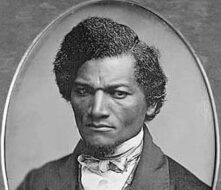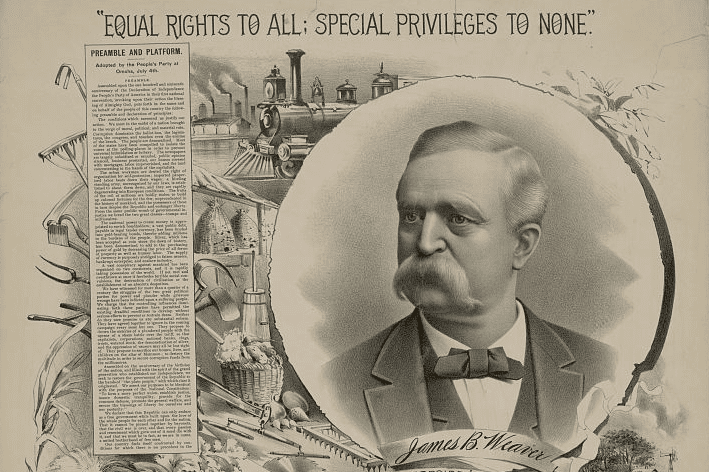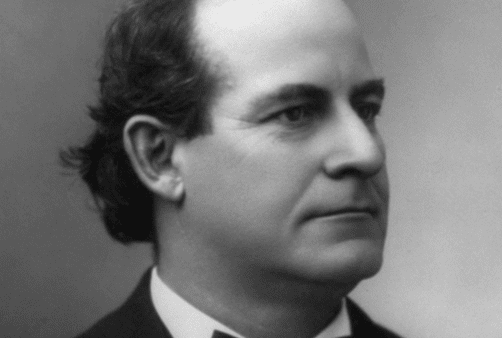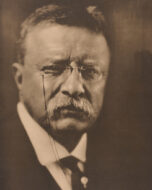

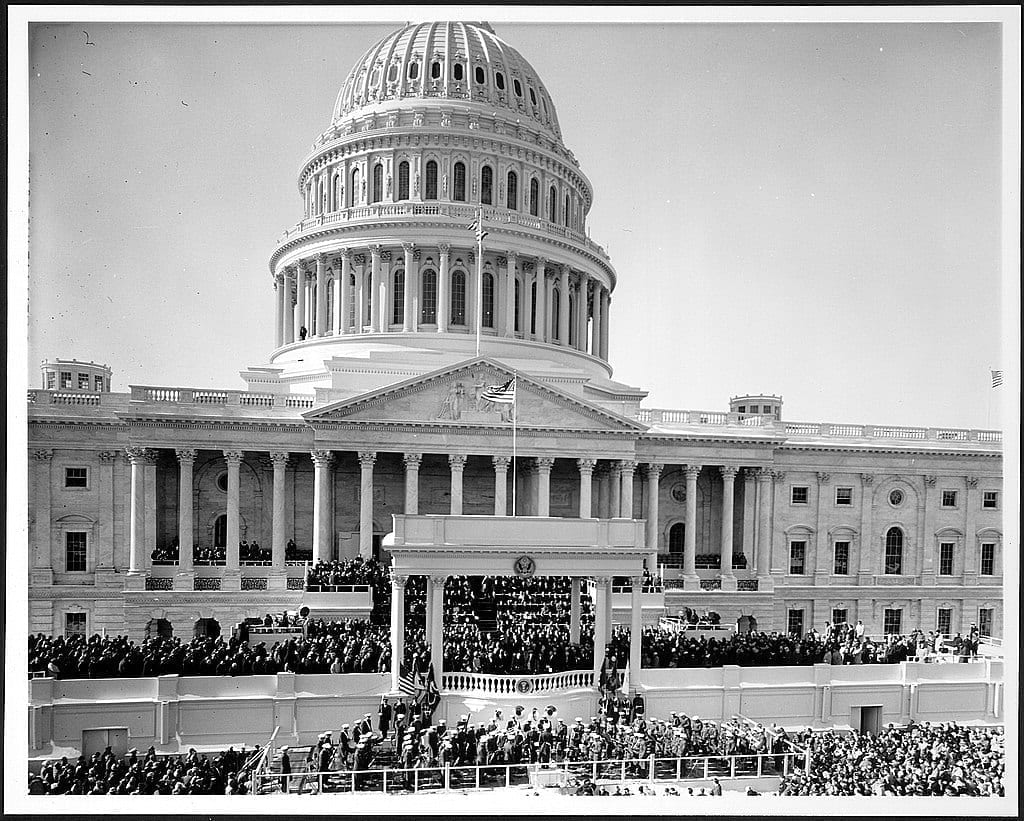
Introduction
After the Civil War, the power of political parties increased dramatically, as they built political party machines in major cities that relied upon and employed patronage distribution of public jobs and benefits to ensure loyalty and cohesion. This made American politics more partisan, allowing majority parties to impose their will and their policies through their control of the government. In Congress, however, the rules were still arranged, so that minority parties could frustrate the will of the majority, even in the House of Representatives. This frustrated no one else more than future Speaker of the House Thomas Brackett Reed (1839–1902). By the time Reed was elected to the Speakership, he had fervently advocated for almost complete majoritarian control of legislation in the House, which would enable it to maintain its responsibility to the people and handle a growing number of tasks. In this document, Reed makes his case for a strict majoritarian principle guiding the proceedings of the House.
Source: Thomas Brackett Reed, “Rules of the House of Representatives,” The Century Magazine, March 1889.
The question of the transaction of business in the House of Representatives has become one of serious import to the country. For the last dozen years there has been a steady determination on the part of powerful men to reduce the business of that body to a minimum. Several men who have occupied important positions, and who have at times received the applause of the injudicious under pretense that what has been called private business is but jobbery and knavery, have done all in their power to obstruct and block that kind of business. . . .
But the blocking of the public business by a set of rules which can be wielded by two or three men has aroused and interested the country; for the rights of all are immediately concerned. To gratify the natural curiosity of those who desire to know how 325 men, each the flower of a flock of 30,000 voters, could make regulations to deprive themselves of power and could year after year submit to such deprivation is one object of this article. Another object is to help induce the people of the United States to insist upon the restoration of republican government in the House of Representatives.
Ever since the slavery question came to trouble the peace of the country the rules of the House have been framed with the view of rendering legislation difficult.[1] The South was anxious that there should be ample means at its disposal to stop any measure detrimental to its cherished institution. Hence when the revision of rules by the 46th Congress [1879–1881] was made, the foundation was sufficiently bad, and experience has shown the superstructure to be still worse. Several causes contributed to this result. The situation of the Republican party was such that all power given to minorities seemed to inure to its advantage. Mr. Randall,[2] then as at all times the strong figure in whatever transaction he participates, was the real governing force. He had passed his life in the minority trying to prevent things from being done, and was therefore more anxious that the new machine should have perfect back action than that it should have forward movement. The old system which Mr. Blaine[3] surrendered to him after the fatal campaign of 1874 was by no means perfect, but it had a certain liberty of action and was not a perpetual invitation to blockade and filibuster.[4] In those days there used to be what was called a “morning hour,” wherein committees reported bills and put them on their passage.[5] Each committee had this hour for two days, and could continue until finished any measure pending when the second hour closed. This hour was flexible—not merely a literal hour of sixty minutes, but one which might continue the whole day, if the House so desired. Hence there was no chance to clog business; for whatever business was entered upon must be finished, and there were eager committees waiting for their turn.
When Mr. Randall came into the chair he changed all this by ruling that the “morning hour” was sixty minutes, and sixty minutes only. This changed a flexible conduit for business which could not be crowded to a cast-iron tube which could be packed to stoppage by sixty minutes’ work a day. Under the new revision in 1878 even this tube was plugged up and no bills could be passed during this hour. They could be reported, but not acted upon. For action the new system provided three calendars—one for public bills appropriating money, one for public bills not appropriating money, and the third for private bills.[6] It was intended that each calendar should be taken up at a proper time, and the bills disposed of each in its turn. This was apparently a clear and beautiful system, logical and practical, but the trouble with it was that it refused to march. It did not work. It had one fatal defect: it was based on the idea that the House did all its work—that the ten thousand bills were all passed upon—before the body adjourned. If, like the legislature of Maine, the Congress of the United States said yea or nay to every bill and every petitioner, the plan would have been a good one, for the question when a bill shall be considered is of small consequence if it is sure to be considered. . . . But, unfortunately for the plan, the business of the United States is rather more varied and abundant than the business of Maine, and . . . Congress says yea or nay to only eight percent—or one in sixteen—of its bills and practically to none of its petitioners. . . .
The important question, however, is what should be the remedy for this evil, the extent of which is not half appreciated by the people of the nation. There is only one way, and that is to return to the first principles of democracy and republicanism alike. Our government is founded on the doctrine that if 100 citizens think one way and 101 think the other, the 101 are right. It is the old doctrine that the majority must govern. Indeed, you have no choice. If the majority do not govern, the minority will; and if the tyranny of the majority is hard, the tyranny of the minority is simply unendurable. The rules, then, ought to be so arranged as to facilitate the action of the majority. This proposition is so simple that it is a wonder that there could be any discussion about it, and yet recently in the House there was much said in debate about the “rights of the minority” and that the rules of the House, instead of being merely business regulations, a mere systematization of labor, were a charter of privileges for those whose arguments were too weak to convince the House.
This indicates confusion of thought. There is only one charter of the rights of minorities, and that is the Constitution of the United States. That defines the power of Congress and implies that Congress shall act by its majority. Under that Constitution and within its scope whatever a majority does is right. Regulations and rules, then, are not made to protect those who are wrong, but to facilitate the proceedings of those whose action when it takes place becomes the law of the land. Of course such rules ought to provide for debate and for due and careful consideration. But after debate and after due and careful consideration there ought to be no hindrance to action except those checks and balances which our Constitution wisely provides. If the majority of the House of Representatives each man selected from at least thirty thousand voters cannot be trusted, who can? Nor is this the only safeguard. Each one of these men is watched by the people. He renders account at the end of each term. If such a man so situated must be held in leading-strings, representative democracy is a failure. . . . It seems strange, under a republican government and speaking of the popular branch of the legislature of a republic, to be obliged to refer to principles so fundamental; but the longer one studies politics in this country the more he will long to see universally prevalent a wider understanding and a deeper-rooted belief in some of the principles advocated by Thomas Jefferson, whose memory to-day seems to be most vociferously cherished by those who never act on his opinions.
It is impossible, and perhaps would be indiscreet in advance of due popular discussion, to indicate the remedy for the evil which the foregoing simple narrative of facts discloses, but that some remedy should be applied admits of no doubt. The remedy ought not to be radical or wild in its character. Indeed, from the nature of things it could not be so. There need never be any fear lest an avalanche of legislation could burst upon the country. Do the best we can our parliament will be clogged, like every other similar assembly in the world of like scope and magnitude. . . . Two and probably three changes ought to be made, and the effect should be faithfully tried. The morning hour, the length of which should be entirely under the control of the House, would, if restored to its full power and efficiency, afford means for the transaction of all business of a simple nature requiring little discussion. Then a provision enabling the majority of the House to select from the public calendars such measures as it prefers to act on, with due precedence for revenue and appropriation, would insure such freedom of action as would destroy the illegitimate power of the few and exalt the just power of the people acting through their own representatives.
To guard against the abuse of the motions to adjourn, to fix the day of adjournment, and for a recess, the simple amendment devised and read in the House recently by Mr. Cannon of Illinois[7] would be ample and valuable. That amendment provides that those motions shall be confined to their legitimate and honest use and shall never be used as dilatory motions for simple delay. If it is objected, that this places too much power in the hands of the Speaker, the answer is twofold. No Speaker would pronounce motions legitimate on their face dilatory and intended for delay until that fact was apparent to the whole world, and if he did unjustifiably exercise that power reposed in him as the organ of the House an appeal to the House would easily rectify the abuse. The danger in a free country is not that power will be exercised too freely, but that it will be exercised too sparingly; for it so happens that the noise made by a small but loud minority in the wrong is too often mistaken for the voice of the people and the voice of God.
- 1. Most of these rules fall under the definition of “dilatory tactics,” which were procedures enabling the minority party the ability to delay passage of legislation. For instance, the minority party could introduce amendments and withdraw them repeatedly, forcing debate on the amendments each time they were introduced. These tactics were essentially versions of legislative filibusters like the one that still exists in the U.S. Senate today (see note 4 below).
- 2. Samuel J. Randall (1828–1890) was the Speaker of the House from 1876 until 1881. During this time, there was a crisis regarding the election of President Grant’s successor. He ultimately ceded his influence over the outcome of the decision—between Samuel Tilden and Rutherford B. Hayes—to end Reconstruction in the South.
- 3. James G. Blaine (1830–1893) served as a senator, Speaker of the House, and as secretary of state. During his tenure as Speaker (1869–1875), Blaine and President Grant developed a close bond. The Democrats retook the House in 1874, deposing Blaine, and allowing him to develop the unsuccessful Blaine Amendment, which would codify the separation between church and state in the Constitution.
- 4. A filibuster is an attempt to prevent the passage of legislation by debating it indefinitely. It is associated with the procedures of the U.S. Senate today. For more background on the Senate filibuster, see Debate on the National Bank Filibuster. Reed’s use of the term “blockade” similarly refers to attempts by the minority party to block the majority from passing legislation.
- 5. i.e., enacted them into law.
- 6. The calendars in the House of Representatives are lists of measures that are pending for debate, consideration, and passage on the floor of the House. Bills are placed on the calendar and taken up in chronological order. As Reed indicates, while this approach makes sense in theory, in practice it is difficult because the House cannot consider all of the legislation introduced in a single two-year session, so there must be a way to move a bill up on the calendar so that it can be passed.
- 7. Joseph Gurney Cannon (1836–1926) was a representative from Illinois who served as Speaker of the House from 1903–1911. A formidable figure, Cannon dominated the House of Representatives during the first decade of the twentieth century. Thomas Brackett Reed (the author of this piece) and Cannon are typically regarded as the two strongest Speakers in the history of the House. Cannon’s power was stripped in a dramatic revolt in 1910 (see The “Revolt of 1910” Against Speaker Joseph Cannon and Speech on Party Leadership in Congress). Cannon was featured on the cover of Time Magazine’s first issue when he retired from politics in 1923.

Conversation-based seminars for collegial PD, one-day and multi-day seminars, graduate credit seminars (MA degree), online and in-person.


















